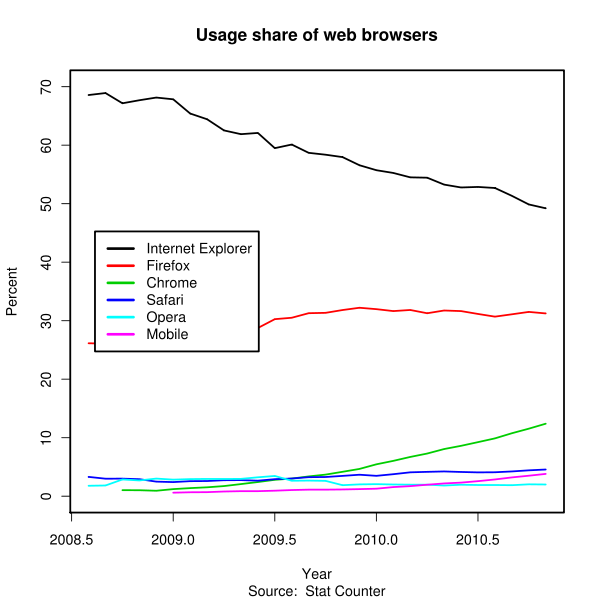The case of Opera is a strange one at first glance. Here is an innovative and powerful browser that’s fast, good looking and has all the features you might want–indeed, it has more features than all the other browsers, and tends to introduce the good things first (Opera had tabs first)–and yet with all of that it still has a tiny market share. Beyond a small, dedicated user base people just don’t use Opera. Here’s a graph of browser share of the recent years:

What’s going on here? Why are Firefox and Chrome eating away at Internet Explorer, while Opera is staying pretty much where it always was. It’s not that Opera is lagging behind development wise–new versions are coming out all the time. So what is it? Chrome and Firefox just have something that Opera doesn’t.
It’s all to do with brand positioning. Chrome is the fastest browser. It’s also the simplest. Google’s brand positioning is simplicity and speed, and they’ve made sure their offering is the leader in both. Firefox? The most customizable browser. Again, it’s a leader. If I want the most customizable browser, Firefox would be my first choice.
Internet Explorer, Safari and Opera? There’s nothing that comes to mind. IE and Safari are the “default” browsers on their respective operating systems. They don’t really try to differentiate themselves, although Apple (and Microsoft) have been advertising speed and standards compliance lately. Speed is easily tested however (and irrelevant if you’re not the leader), and standards compliance doesn’t matter so much since all modern browsers tend to render most sites just fine.
Opera has always advertised everything, from speed and security to innovative new features. You could say Opera is the most innovative browser as it pretty much had all the interesting features (like tabs) first and is still going strong with stuff like mouse gestures and Turbo, but “innovation” on its own doesn’t sound like an enticing benefit to the consumer because innovation isn’t easily quantifiable–sure, it’s innovative and powerful, but so what? Speed, simplicity and customization are much easier to understand and quantify, which lets Google and Mozilla position their browsers clearly in the mind of the consumer.
When people choose products they tend to go for the leaders. Branding is what helps differentiate those leaders from each other. There’s not just one leader in beer, there’s the leading light beer, the leading imported beer, the leading microbrew, the leading ice beer, the leading high-priced beer, and so on, and so forth. If you can’t dominate a product category, you invent a new one and dominate that instead. With browsers, you pick a specific benefit, and focus on that.
Google dominates speed and simplicity. If I want the fastest or simplest browser, I’ll pick Chrome. Firefox dominates customization. If I’m a power user and want to customize my browsing experience by installing specific add-ons I’ll pick Firefox. The other browsers may be good at some other things, but they don’t really stand for anything. There are 5 major browsers on the market right now, and countless smaller ones, so simply making a better browser won’t help you get market share.